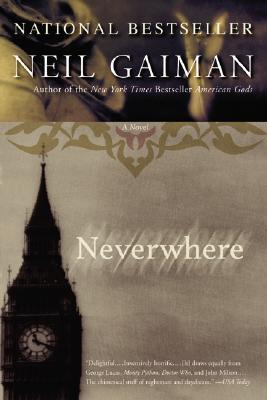TL;DR
In Neil Gaiman's 'Neverwhere', Richard Mayhew's act of kindness propels him into a surreal underworld beneath London, filled with bizarre characters and perilous adventures as he seeks to return home.
What is Neverwhere about
'Neverwhere' explores the life of Richard Mayhew, who, after helping a mysterious girl named Door, finds himself in an alternate London, the London Below. This strange realm is populated by a host of unusual and often dangerous denizens, including angels, knights, and other fantastical beings. Gaiman's narrative combines elements of fantasy, adventure, and social commentary, reflecting on themes of isolation and the hidden lives of those who exist on the margins of society. Originally released in 1996, the novel is based on the BBC series created by Gaiman, showcasing his unique storytelling style and rich imagination.
Neverwhere 8 Key Takeaways
Richard's act of kindness.
Richard Mayhew, a young businessman, stumbles upon a bleeding girl named Door and decides to help her, an act that thrusts him into a hidden world.
Arrival in London Below.
After helping Door, Richard finds himself invisible to the world he once knew, trapped in the bizarre city of Neverwhere, filled with monsters and saints.
Meeting dangerous characters.
As Richard navigates this underground city, he encounters various odd characters, including the sinister Mr. Croup and Mr. Vandemar, who chase him and Door.
The quest for Door's family.
Door is on a mission to uncover the truth about her family's murder, leading Richard into a series of perilous adventures as they seek allies.
The Angel Islington.
Richard and Door seek out the enigmatic Angel Islington, who holds the key to Door's past and their escape from London Below.
Richard's transformation.
Throughout his journey, Richard evolves from an ordinary man to someone who confronts challenges and embraces the chaotic reality of Neverwhere.
Climactic showdown.
The climax involves a confrontation with Islington and the revelation of deeper truths, testing Richard's resolve and courage.
Return to the surface.
Ultimately, Richard must choose between returning to his mundane life or remaining in the fantastical realm of Neverwhere, illustrating the themes of belonging and identity.
Top Neverwhere Quotes
- 'Things that never happen, like things that happen, are not always what they seem.'
- 'You get what anybody gets - you get a lifetime.'
Who should read Neverwhere?
'Neverwhere' appeals to readers who enjoy dark fantasy and intricate world-building. Fans of Neil Gaiman's unique storytelling style and those fascinated by explorations of social issues through fantastical lenses will find inspiration and depth in this tale.
Neverwhere Best Reviews
- Gaiman's 'Neverwhere' is a masterclass in world-building, offering readers a darkly enchanting journey through a labyrinthine London that exists just beneath our own. - The Guardian
- 'Neverwhere' brilliantly blends fantasy and the mundane, creating a gripping narrative that keeps readers captivated from start to finish. - Publishers Weekly
People also liked these summaries
Neverwhere FAQs
What inspired Neil Gaiman to write Neverwhere?
Neil Gaiman conceived 'Neverwhere' as a response to his experiences with urban life and the unseen realities that exist beneath society's surface. It intertwines his fascination with myths and contemporary settings.
Is Neverwhere suitable for young readers?
While 'Neverwhere' is primarily aimed at adults and older teens, its themes and storytelling may resonate with younger readers who are mature enough to engage with darker fantasy narratives.
